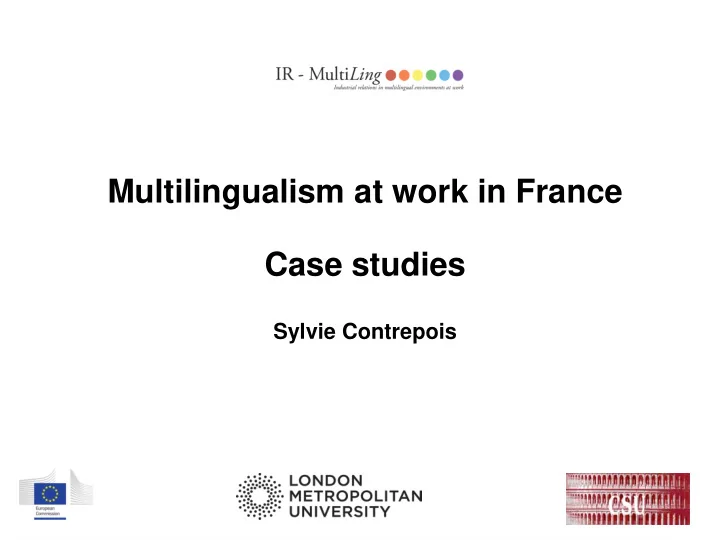

Multilingualism at work in France Case studies Sylvie Contrepois
The fieldwork in France Fieldwork preparation : interviews with experts (6) ; workshops organised by ministry of culture (1) and Association des managers de la diversité (1) Case studies : Interviews conducted in construction (1 top manager), cleaning (2 cleaners), health (3 nurses). Interviews conducted with actors operating in the above mentionned sectors (2)
Experts views Issues raised by multilingualism at work revolve mainly around the 2 following points : 1) English is becoming dominant in a growing number of situations and French legislation is not respected ; 2) While most immigrants are Francophone and all are supposed to speak French, analphabetism creates the disadvantage. Company segmentation: different issues at different levels. Social partners not very active in this field.
Cleaning sector Large aerospace plant (4000 employees, mainly engineers), cleaning subcontracted. About 100 cleaners, different ethic backgrounds with a majority of Portuguese . French is the dominant language. If and when languages issues, this is managed within the working team. No specific language training provisions, no translations.
Construction sector A large French multinational company, leader on its market (About 6000 employees in France) ; Three 'worlds' : 'ordinary' jobs (locals) ; highly- sought-after skilled professions (international) ; managers (international). Working language : French and language of the country ; English due to recent merger. Company provisions for language training for employees and partner. No provisions for translation
Health sector Different activities : hospital and occupational health. Intermediate staff (nurses, secretary): French citizens, supposed to speak French. Patients : all ethnic backgrounds. Work exclusively in French. If and when languages issues, they are managed within the collective. A few tools : a list of staff speaking foreign languages ; help line with interpreters ; book « English in hospital ». Access to language training and to 'multiculturalism' training at the workplace. Issues of language never raised by trade unions.
Actors operating in the sectors Top manager from a company of temporary work ; trade union organisers (undocumented workers). 'Not much language issues':confirm that most workers are speaking French. Partial acknowledgement of communities on TU side – use of interpreters in case of chineese workers. Refusal of communities on the Company side. Language is considered as a specific 'qualification'. But no formal method to assess this qualification.
Provisional conclusions Case studies tend to confirm experts statements (company segmentation, domination of English, issues of multilingualism largely ignored). Difficulties raised by multilingualism appeared to be taboo, especially when this can lead to consider discrimination process. Immigrant plurilingualism never acknowledged as a specific qualification. Hypothesis : Invisible process of racial and social discrimination operating on the basis of the different level of language command.
Recommend
More recommend